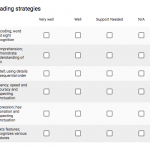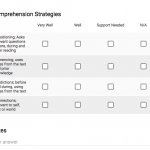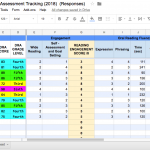We extended our knowledge and understanding gained from our first project when we unpacked the Growing Success document to further understand assessment for, as and of learning. We created more effective and efficient assessment practices that further increased student achievement as well as accountability, both for the teacher and the students. These assessment practices created greater opportunities for students to demonstrate their learning. We explored assessment practices and tools through the Modern Learning lens by collaborating with four teachers from each division. Through this collaboration, we gained further knowledge and understanding for assessment and pedagogical documentation. This feedback allowed us to inform our future instruction to help close gaps.
Team Members
Luisa Esposito
York Region District School Board
Salima Fancy
York Region District School Board
Joanne Bergeron
York Region District School Board
Professional Learning Goals
- We expanded our knowledge of using technology to capture evidence of learning through Google apps
- We collaborated with teachers in various grades to develop grade-specific reading assessments using Google Forms
Activities and Resources
- We explored best practices and innovation in assessment through YouTube, webinars and websites
- We participated in the 4C model to co-plan, co-teach, co-debrief and co-reflect, and we created better assessment practices with our community of educators
- We created opportunities to demonstrate our learning and demonstrated the tools we created through grade partner sharing, divisional sharing and job-embedded professional development and staff meetings
Unexpected Challenges
We encountered scheduling conflicts with our system leads. Our goal was to begin our project earlier in the school year, however, our timeline was delayed until the end of Term 1.
Enhancing Student Learning and Development
By understanding assessment for, as and of learning deeply, we were able to create interventions that focus on each individual student’s areas of need. We would like students to feel empowered by the feedback that they receive so that they can self-regulate to further their achievement. By accessing the summary and responses in Google Forms, we can identify whole class patterns and individual students. Student data is organized in Google Sheets that allows the teacher to quickly view results, analyze the data, provide timely feedback to students, and design intentional interventions.
Sharing
We use our release time and teacher prep time to share the digital tools created with other teachers. Through professional dialogue, we adapted various forms to meet teacher’s needs. We shared our learning at monthly staff meetings and divisional meetings. We have made ourselves available to collaborate with teachers.
Project Evaluation
- We found a great interest amongst our colleagues who reached out to work with us and develop tools for reading assessment and using Google Forms for other subject areas
- Our checkpoints allowed us to ensure that we stayed on track and reassess our needs
- Our Google Forms allowed us to quickly generate data to easily analyze student achievement
Resources Used
Grade 4-8 Diagnostic Reading Assessment (DRA)
Grade 1-8 Ontario Curriculum
Growing Success
Resources Created
These resources will open in your browser in a new tab, or be downloaded to your computer.




